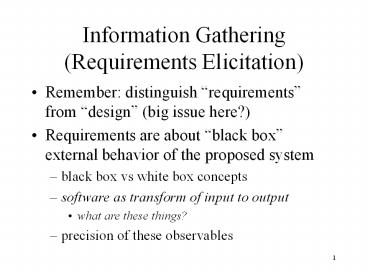Information Gathering (Requirements Elicitation) - PowerPoint PPT Presentation
Title:
Information Gathering (Requirements Elicitation)
Description:
Information Gathering (Requirements Elicitation) Remember: distinguish requirements from design (big issue here?) Requirements are about black box ... – PowerPoint PPT presentation
Number of Views:153
Avg rating:3.0/5.0
Title: Information Gathering (Requirements Elicitation)
1
Information Gathering(Requirements Elicitation)
- Remember distinguish requirements from
design (big issue here?) - Requirements are about black box external
behavior of the proposed system - black box vs white box concepts
- software as transform of input to output
- what are these things?
- precision of these observables
2
Cool Quote
- Steve McConnell says,
- The most difficult part of requirements
gathering is not the act of recording what the
users want it is the exploratory, developmental
activity of helping users figure out what they
want.
3
Finding Requirements(a process)
- Do outside research in domains of concern
- what resources do we have?
- how well have you researched the domains?
- Only speak users terms and definitions
- Ask questions (first few rounds)
- after initial rounds, ask questions with binary
answers - Analyze, Follow up - Repeat
4
Ask Questions Written
- Do basic research first!
- do NOT ask questions that have been answered
- show you followed up to last sessions
- Focus your questions
- do NOT ask wide open questions (exceptions)
- short, simple, answerable yes/no preferred
- if complex, ask multi-part questions
- use models / documents as points of reference
5
Ask Questions - Written
- Give feedback on the answers
- offer an example, is this what you mean?
- narrow the question if you must
- do not move on until you understand
- or agree to look further
- think like a customer wholl have to live with
this thing youre going to describe - think like a coder wholl have to build it!
6
Ask Questions - Written
- Have ALL critical written documents in your
possession. - make sure your customer has copies when you
discuss them - Build models (documents) to discuss!
- does our context diagram raise issues for you?
7
Analyze Customers Written Answers
- Give them an identification number, file them
with all relevant information (dates...) - Carefully parse answers for critical info
- priorities (nice must - clarify what these
mean with your customer!) - get definitions of any new domain terms
- generate new questions if necessary
8
Follow Up to Questions/Answers
- Careful review of all customer provided
information - make connections - old things look different after new information
- Recognize customers time and effort
- let them know how it helps you
- always find some positive contribution, even when
it looks bleak (then continue to ask...) - Ask new questions only when done with old
9
Teleconferences
- Appoint a note-taker, the job is to RECORD
- must be precise and complete
- Prepare
- current docs,
- prepared question lists (with space for notes
underneath) - pens, paper, tape recorder (with permission
only!) - possibly web access
- FAX documents for discussion ahead
10
Teleconferences
- Be on time (respect customers schedule)
- Have customer and others present sign off on
the notes after they are complete - make a full report of the session
- who, what happened, when, where
- send the report to all concerned parties and ask
them for any corrections or comments - archive the info
11
In Person Meetings
- Have a note taker, recorder present
- Prepare a meeting report for sign off as before
- Have physical copies of all relevant documents
- enough to go around to all parties at the meeting
12
In Person Meetings
- Be aware of body language / personal issues
- if someone on your team doesnt get along, they
should be reassigned -) - trust your intuition
- be kind, gentle and understanding
- be aggressive only when appropriate (when
challenged or friendly banter)
13
Main Themes
- Were writing Requirements
- Our job serve the customer
- be prepared
- make the customers job as easy as possible
- Customers job help us serve them
- this is implicit in the customer / developer bill
of rights in Wiegers - realistically this is a problem, refer to above
(our job!) - Be professional at all times































